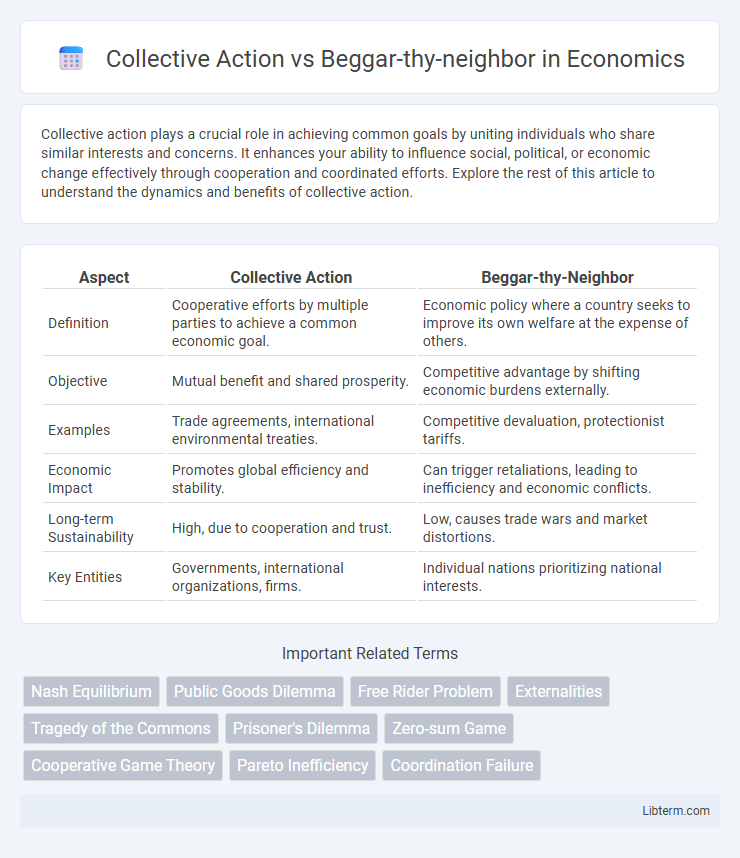Collective action plays a crucial role in achieving common goals by uniting individuals who share similar interests and concerns. It enhances your ability to influence social, political, or economic change effectively through cooperation and coordinated efforts. Explore the rest of this article to understand the dynamics and benefits of collective action.
Table of Comparison
| Aspect | Collective Action | Beggar-thy-Neighbor |
|---|---|---|
| Definition | Cooperative efforts by multiple parties to achieve a common economic goal. | Economic policy where a country seeks to improve its own welfare at the expense of others. |
| Objective | Mutual benefit and shared prosperity. | Competitive advantage by shifting economic burdens externally. |
| Examples | Trade agreements, international environmental treaties. | Competitive devaluation, protectionist tariffs. |
| Economic Impact | Promotes global efficiency and stability. | Can trigger retaliations, leading to inefficiency and economic conflicts. |
| Long-term Sustainability | High, due to cooperation and trust. | Low, causes trade wars and market distortions. |
| Key Entities | Governments, international organizations, firms. | Individual nations prioritizing national interests. |
Understanding Collective Action in Economics
Collective action in economics refers to situations where individuals or groups collaborate to achieve a common goal that benefits all participants, such as public goods provision or environmental protection. Unlike beggar-thy-neighbor policies, which prioritize national interests at the expense of others, collective action emphasizes cooperation to overcome collective dilemmas and maximize overall welfare. Understanding the mechanisms and incentives that drive collective action is crucial for addressing global challenges and avoiding negative externalities associated with competitive, zero-sum strategies.
Defining Beggar-thy-neighbor Policies
Beggar-thy-neighbor policies refer to economic strategies where a country seeks to improve its own economic position at the expense of others, often through trade barriers or currency devaluation. These policies can trigger retaliatory measures, leading to reduced global trade and economic welfare. Collective action contrasts this behavior by promoting cooperation among nations to achieve mutually beneficial outcomes and avoid the negative fallout of protectionist tactics.
Historical Context of Economic Cooperation
The historical context of economic cooperation reveals a persistent tension between collective action and beggar-thy-neighbor policies, particularly evident during the Great Depression when countries imposed tariffs and competitive devaluations to protect domestic industries. Such beggar-thy-neighbor strategies, aimed at gaining relative advantage, often exacerbated global economic instability and prolonged recovery periods. Conversely, the development of institutions like the International Monetary Fund and GATT in the post-World War II era exemplifies the shift toward collective action, promoting cooperation to stabilize economies and foster sustainable growth.
The Mechanisms Behind Collective Action
Collective action relies on coordinated efforts among individuals or groups to achieve common goals, leveraging mutual cooperation and shared benefits. The mechanisms behind collective action involve overcoming free-rider problems through incentives, trust-building, and institutional frameworks that encourage participation and compliance. In contrast, beggar-thy-neighbor policies prioritize competitive advantage by disadvantaging others, often leading to retaliatory actions and suboptimal outcomes for the collective.
Negative Consequences of Beggar-thy-neighbor Strategies
Beggar-thy-neighbor strategies often lead to retaliatory trade barriers, escalating into trade wars that damage global economic growth. These protectionist policies disrupt international supply chains, causing inefficiencies and higher costs for consumers. The resulting economic instability undermines global cooperation and can exacerbate unemployment and inflation across affected countries.
Case Studies: Collective Action Successes
Successful cases of collective action often involve international environmental agreements such as the Montreal Protocol, which effectively addressed the depletion of the ozone layer through coordinated global efforts and binding commitments from participating countries. The Paris Agreement illustrates another success, where over 190 nations collaboratively set targets to limit global temperature rise, promoting transparency and shared accountability. These case studies demonstrate that collective action solves transboundary challenges better than beggar-thy-neighbor strategies, which typically trigger retaliation and worsen global outcomes.
Case Studies: Beggar-thy-neighbor Failures
Case studies of beggar-thy-neighbor policies, such as the Smoot-Hawley Tariff Act in the 1930s and recent trade wars between major economies, illustrate the failures of protectionist measures that trigger retaliatory tariffs, reduce global trade, and exacerbate economic downturns. These failures underscore the importance of collective action frameworks like the World Trade Organization, which promote cooperation and dispute resolution to prevent the destructive spiral of protectionism. Empirical evidence from the Great Depression and modern trade conflicts highlights how unilateral economic nationalism undermines global growth and worsens domestic economic outcomes.
International Trade and Policy Coordination
Collective action in international trade involves countries collaborating to establish trade policies that promote mutual economic benefits and reduce barriers, enhancing global market efficiency. In contrast, beggar-thy-neighbor policies, such as protectionist tariffs and currency devaluations, prioritize national gain at the expense of trading partners, often triggering retaliatory measures and trade wars. Effective policy coordination through institutions like the World Trade Organization helps prevent beggar-thy-neighbor strategies by fostering cooperation and dispute resolution among nations.
Balancing National Interests with Global Welfare
Collective action promotes cooperation among nations to address global challenges such as climate change, while beggar-thy-neighbor policies prioritize short-term national interests at the expense of other countries. Balancing national interests with global welfare requires integrating coordinated strategies that enhance sustainable development without triggering retaliatory economic measures. Effective international frameworks like the Paris Agreement exemplify successful collective action, mitigating adverse beggar-thy-neighbor effects through shared commitments and equitable resource distribution.
Pathways Toward Sustainable Economic Collaboration
Collective action promotes sustainable economic collaboration by aligning incentives among stakeholders to address shared challenges like climate change and resource depletion. Beggar-thy-neighbor policies, characterized by protectionism and competitive devaluation, undermine global cooperation and exacerbate economic instability. Pathways toward sustainability emphasize multilateral agreements, transparent governance, and equitable resource distribution to foster long-term economic resilience and environmental stewardship.
Collective Action Infographic

 libterm.com
libterm.com